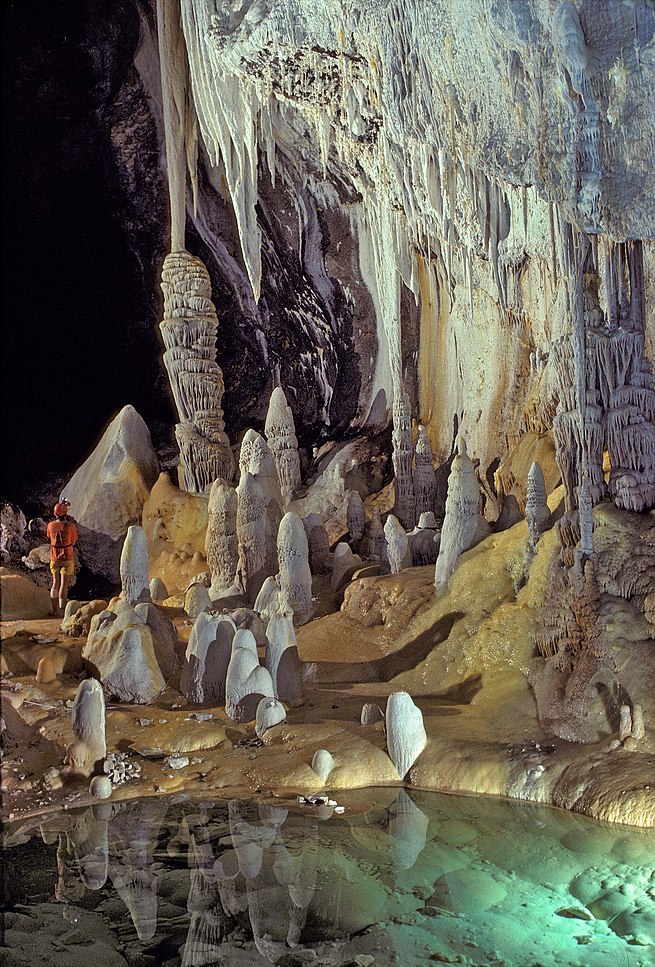
-
Cave
A cave is a hollow place in the ground, specifically a natural underground space large enough for a human to enter. Caves form naturally by the weathering of rock and often extend deep underground. The word cave can also refer to much smaller openings such as sea caves, rock shelters, and grottos, though strictly speaking a cave is exogene, meaning it is deeper than its opening is wide, and a rock shelter is endogene. A cavern is a specific type of cave, naturally formed in soluble rock with the ability to grow speleothems.
Speleology is the science of exploration and study of all aspects of caves and the cave environment. Visiting or exploring caves for recreation may be called caving, potholing, or spelunking.
-
Den (noun)
A small cavern or hollow place in the side of a hill, or among rocks; especially, a cave used by a wild animal for shelter or concealment.
“a den of robbers”
“Daniel was put into the lions’ den.”
-
Den (noun)
A squalid or wretched place; a haunt.
“a den of vice”
“an opium den; a gambling den”
-
Den (noun)
A comfortable room not used for formal entertaining.
-
Den (noun)
A narrow glen; a ravine; a dell.
-
Den (noun)
(a unit of weight)
-
Den (verb)
To ensconce or hide oneself in (or as in) a den.
-
Cave (noun)
A large, naturally-occurring cavity formed underground or in the face of a cliff or a hillside.
“We found a cave on the mountainside where we could take shelter.”
-
Cave (noun)
A hole, depression, or gap in earth or rock, whether natural or man-made.
-
Cave (noun)
A storage cellar, especially for wine or cheese.
“This wine has been aged in our cave for thirty years.”
-
Cave (noun)
A place of retreat, such as a man cave.
“My room was a cozy cave where I could escape from my family.”
-
Cave (noun)
A naturally-occurring cavity in bedrock which is large enough to be entered by an adult.
“It was not strictly a cave, but a narrow fissure in the rock.”
-
Cave (noun)
A shielded area where nuclear experiments can be carried out.
-
Cave (noun)
Debris, particularly broken rock, which falls into a drill hole and interferes with drilling.
-
Cave (noun)
A collapse or cave-in.
-
Cave (noun)
The vagina.
-
Cave (noun)
A group that breaks from a larger political party or faction on a particular issue.
-
Cave (noun)
Any hollow place, or part; a cavity.
-
Cave (noun)
A code cave.
-
Cave (verb)
To surrender.
“He caved under pressure.”
-
Cave (verb)
To collapse.
“First the braces buckled, then the roof began to cave, then we ran.”
-
Cave (verb)
To hollow out or undermine.
“The levee has been severely caved by the river current.”
-
Cave (verb)
To engage in the recreational exploration of caves; to spelunk.
“I have caved from Yugoslavia to Kentucky.”
“Let’s go caving this weekend.”
-
Cave (verb)
In room-and-pillar mining, to extract a deposit of rock by breaking down a pillar which had been holding it in place.
“The deposit is caved by knocking out the posts.”
-
Cave (verb)
To work over tailings to dress small pieces of marketable ore.
-
Cave (verb)
To dwell in a cave.
-
Cave (interjection)
look out!; beware!
-
Cave (noun)
a natural underground chamber in a hillside or cliff
“the narrow gorge contains a series of prehistoric caves”
-
Cave (verb)
explore caves as a sport
“they say they cave for the adventure, challenge, and physical exercise”
-
Cave (verb)
capitulate or submit under pressure; cave in
“he caved because his position had become untenable”
“she finally caved in the face of his persistence”
-
Cave (interjection)
(among children) look out!
